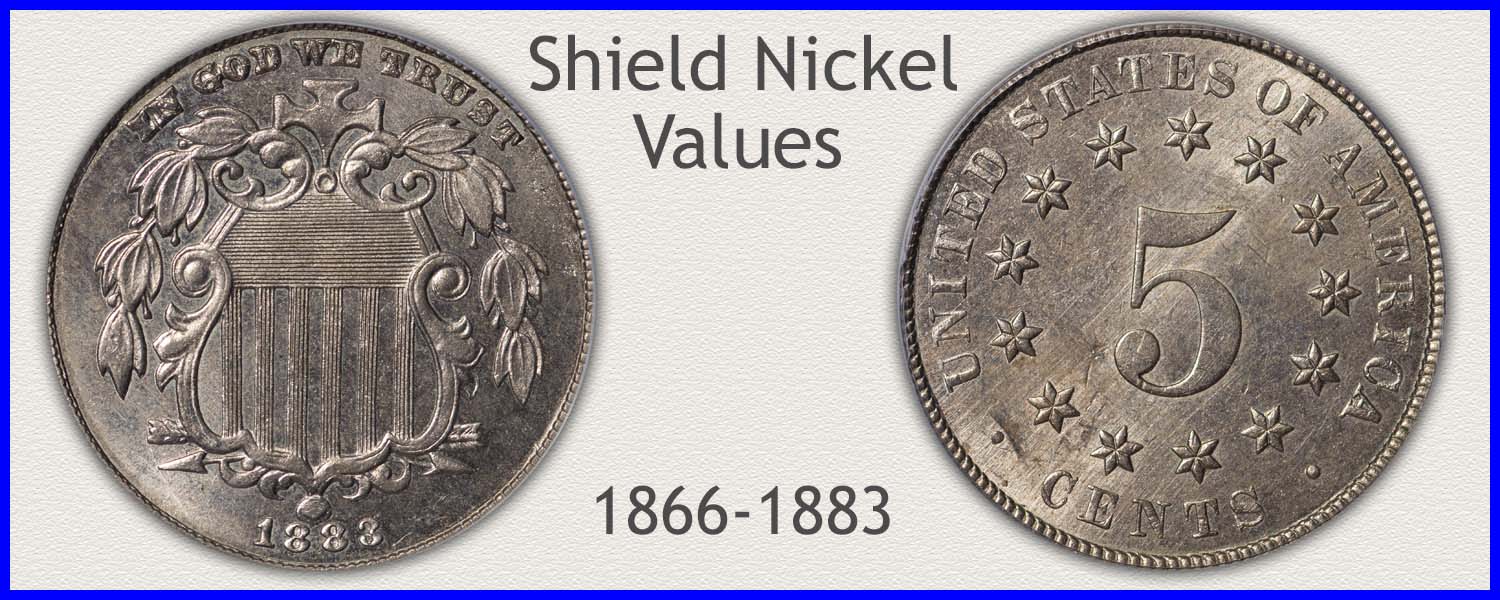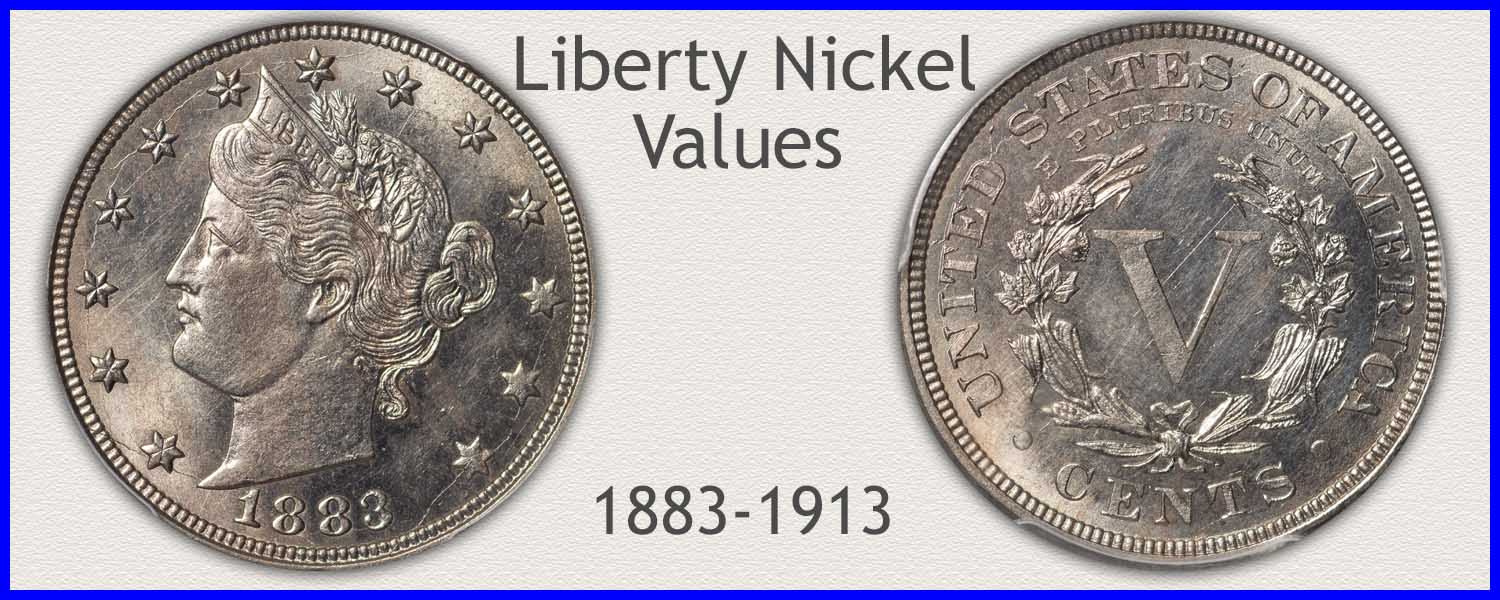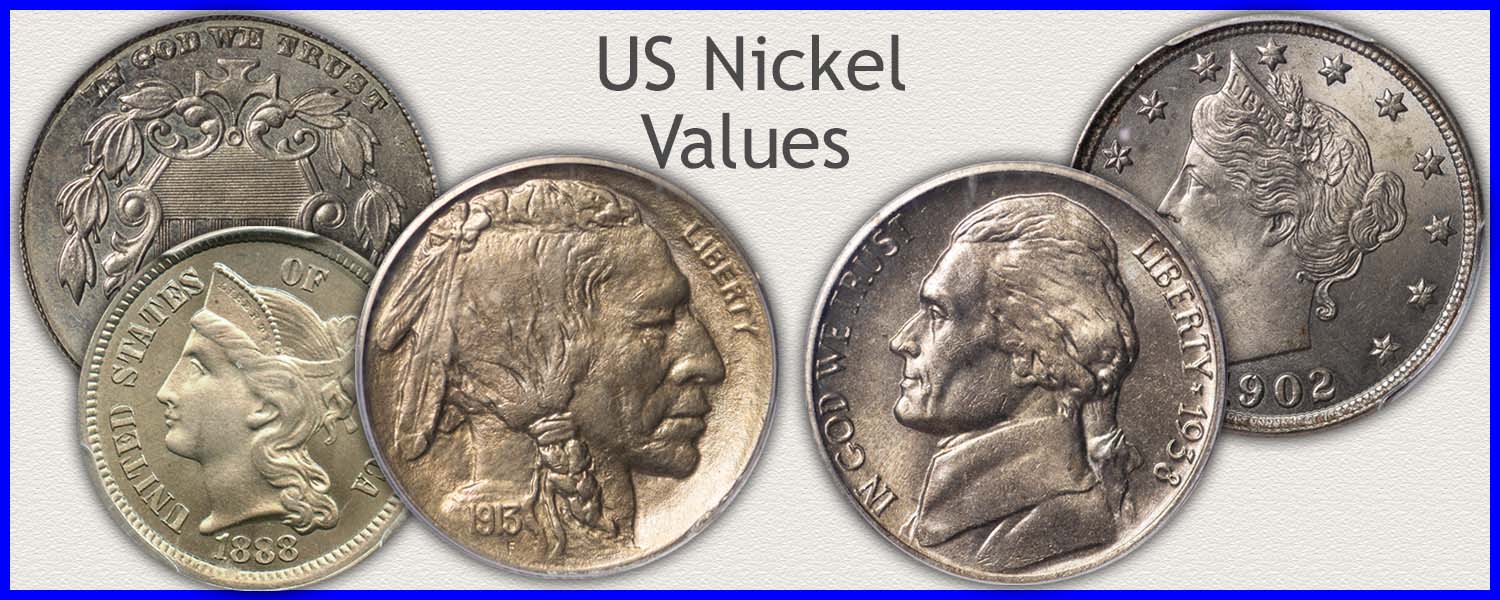Coin Values Moving with Precious Metals: Up-Dated 4/21/2025: Gold $3380 | Silver $32.89
1883 Nickel Value
Determining 1883 nickel value begins with identifying the two different major deign series struck during the year.
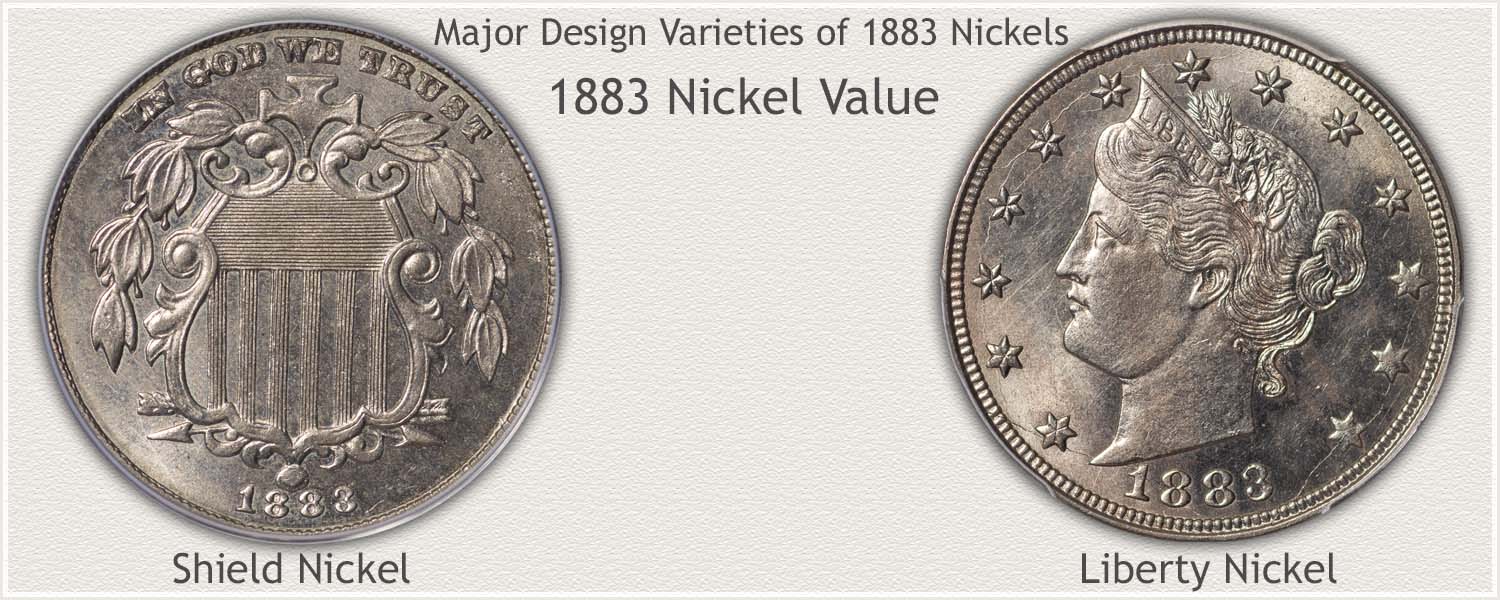
Issued side by side in 1883 was the ending of the "Shield" nickel series, imaged on the left. Also, that year saw the beginnings of a new design; the "Liberty" nickel series, imaged on the right.
A very clear difference is recognized between the two coins, and a very different value scale is found on the chart for each. A step-by-step method is used to sort through varieties, grading condition, and alerts to special qualities possible.
Steps Leading to Value:
- Step 1: Date Identified - Two major varieties and a third reverse variety are identified, all necessary to an accurate valuation.
- Step 2: Grading Condition - Once the variety is confirmed, features specific to each are judged for their state of preservation in a grading process.
- Step 3: Special Qualities - A historical and unusual year of U.S. coinage.
| 1883 Nickel Value | ||||
|---|---|---|---|---|
| Condition of Coin | ||||
| Date | Good | Fine | Extremely Fine |
Mint State |
| 1883 Nickel Value Updated | 2025 | |||
| Shield Nickel | ||||
| 1883 | $20 | $24 | $52 | $98 |
| Liberty Nickel | ||||
| 1883 Without Cents | $4 | $7 | $11 | $49 |
| 1883 With Cents | $16 | $28 | $60 | $106 |
Use the above chart as a starting range to wholesale values. Dealers needs impact values.
Step 1: Date and Three Varieties to Identify
Shield Nickel of 1883
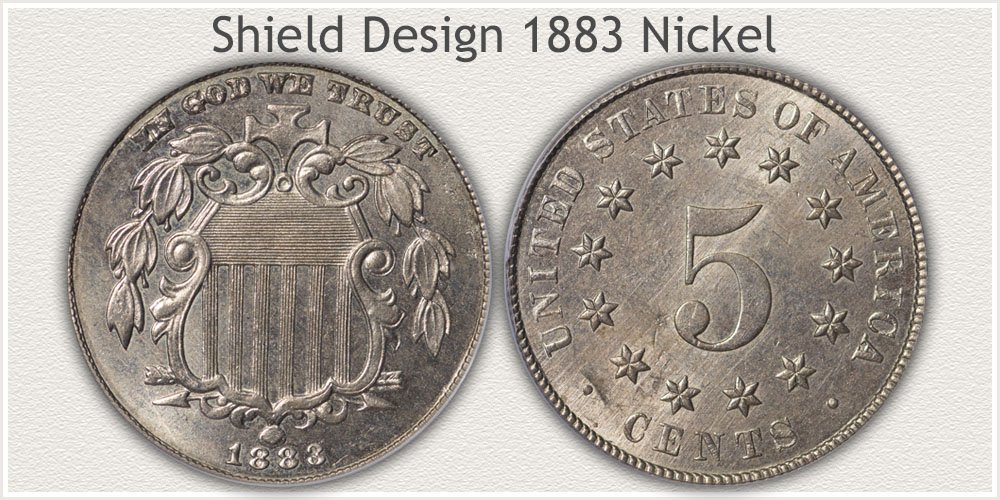
1883 began with the Philadelphia mint continuing production of the Shield nickel design. A series now in its eighteenth year. Filling the obverse is a large shield with olive branches on either side. Interestingly the date is quite small in comparison to other contemporary coinage. The large numeral "5" on the reverse is surrounded by thirteen stars. Becoming an inspiration for the next series of nickels.
However, the Shield series was about to end. Authorization was given in January of 1883 to begin the new Liberty series of five cent nickels. Production of the new design began shortly afterwards. Shield nickels now shared the 1883 date with Liberty nickels. Two different designs sharing the same date is uncommon in U.S. coinage.
Liberty Nickel of 1883 | "Without Cents" Variety
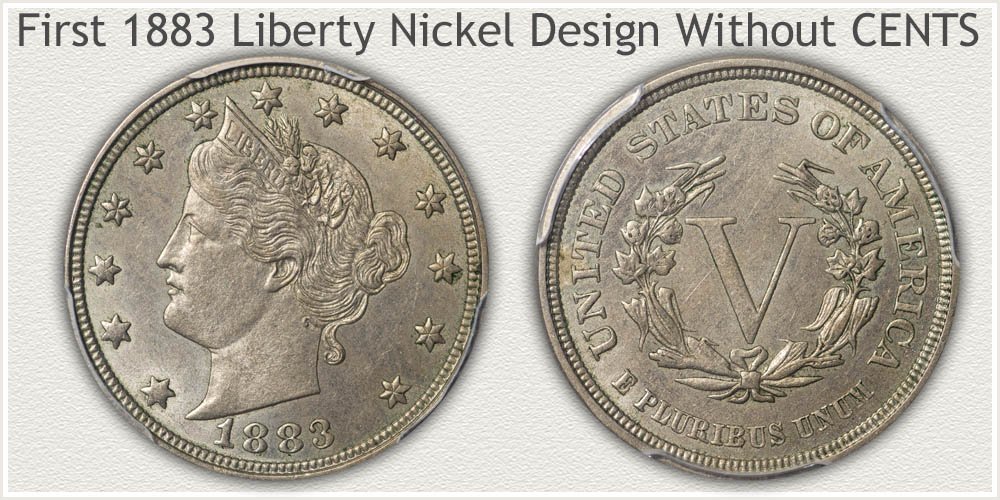
First release of the new Liberty design series is a detailed bust of Lady Liberty as the main obverse feature. A closer design with the rest of the then current coinage in circulation. As example; circulating at the time were cents with the iconic Indian design, dimes through half dollars with a seated Liberty as their major designs.
A large "V" Roman numeral is now featured as the central device on the reverse of the coin. Surrounded by a wreath. Importantly: "E Pluribus Unum" is in the lower area just above the rim. No mention of the denomination is the significant missing feature. These are the "Without Cents" variety.
Liberty Nickel of 1883 | "With Cents" Variety
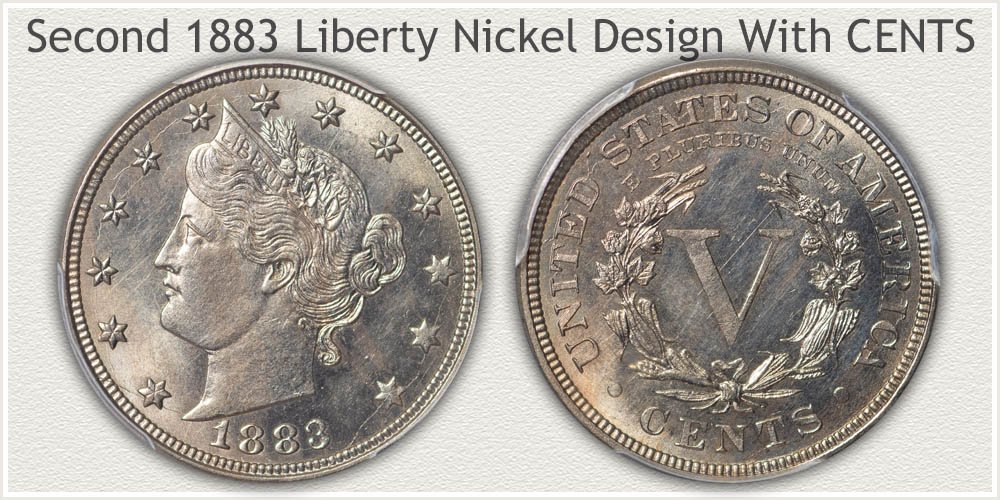
Soon after the first of the Liberty series was released, and a need to include a clear denomination was realized, the reverse was changed.
Displacing "E Pluribus Unum" at the lower rim, CENTS was added. E Pluribus Unum (Out of Many, One) was moved above the large "V." The obverse of the coin remained the same with Liberty's portrait. These are the "With Cents" variety and became the third distinct variety minted in the year. A satisfactory design was achieved and continued unchanged until the ending of the Liberty series in 1912.
Step 2: | How to Grade the Major Varieties of 1883 Nickels
Condition is Defined into a Grade and Determines 1883 Nickel Value
Leading to an accurate reading of the value chart is the need to determine the condition of each coin. Grades are a definition of condition and used as standards by the collecting hobby indicating the different conditions of wear.
Specific features on coins are inspected and judged for preservation to arrive at a grade. Note: Condition patterns on Shield and Liberty nickel are uniquely different. However, grading standards applied to the Liberty design is appropriate for both Liberty nickel varieties.
Grading Shield Nickels
Mint State Grade Shield Nickel
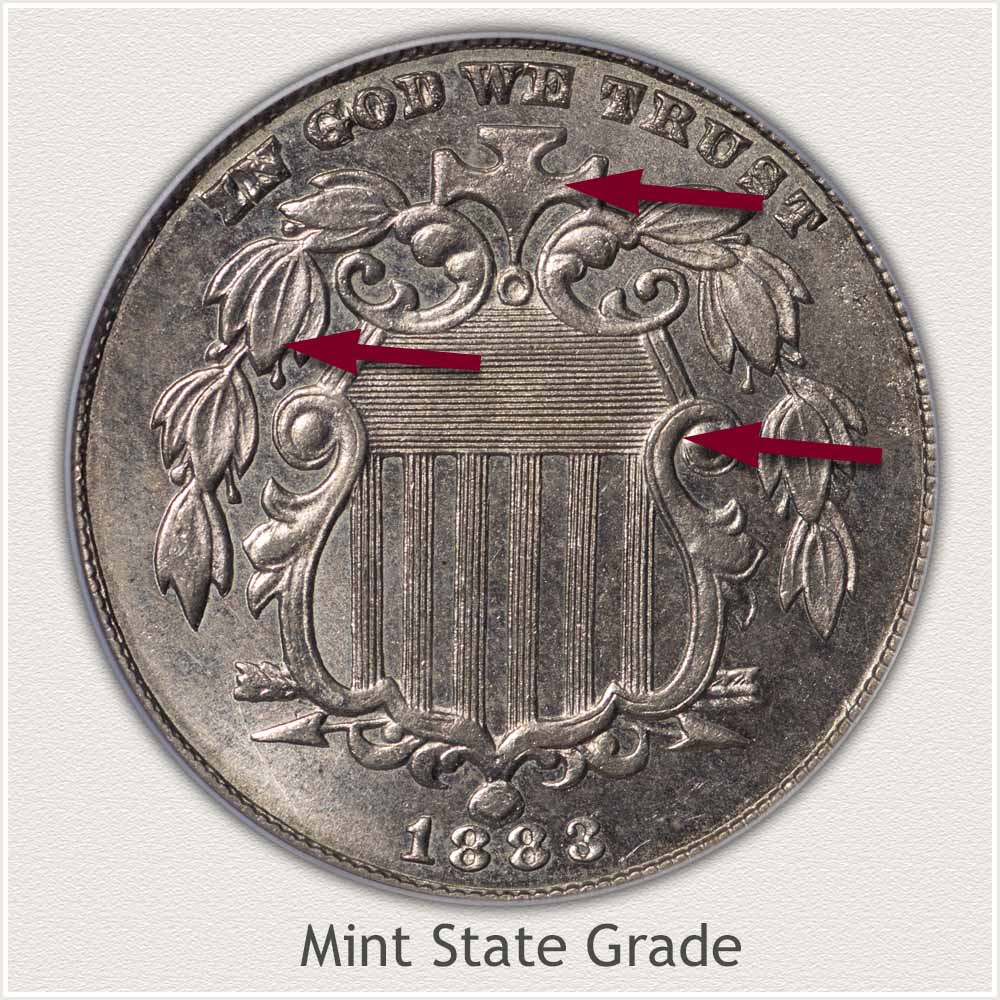
Mint State: Still displaying the shine of a new coin, the texture of original mint luster covers the entire coin. No wear to this delicate surface defines the mint state grade. Key features are inspected and judged to confirm an intact surface is visible.
Look closely at the Cross, the frame surrounding the shield and the leaves on either side of the shield. These areas all still glimmer when tilted under a light. Any wear shows as a smoothing of the surface and the metal changes becoming duller. Small flattened spots on these high points are a sure sign of wear.
Extremely Fine Grade Shield Nickel
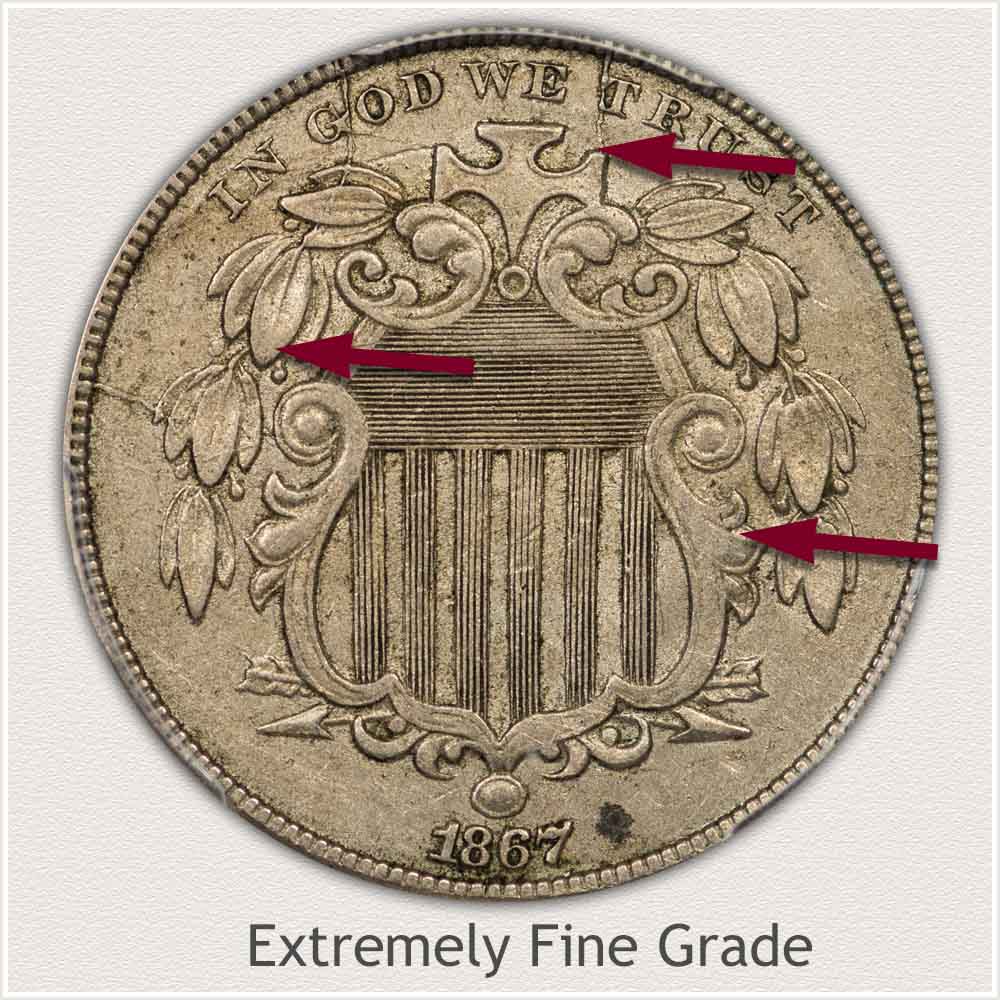
Extremely Fine: Once very light wear is visible on the highest areas of the design this becomes the definition of the Extremely Fine grade. With only small areas of smoothing and flatness, collectors are very interested in eye appeal examples in this condition.
Both the cross above the shield and leaves, specifically the ends of the leaves, are well defined and bold. Wear is confined to the center of the cross and edges of the leaves. The many fine lines of the inner shield and border display boldly. A soft gray color is now covering the coin, replacing the shine of luster.
Fine Grade Shield Nickel
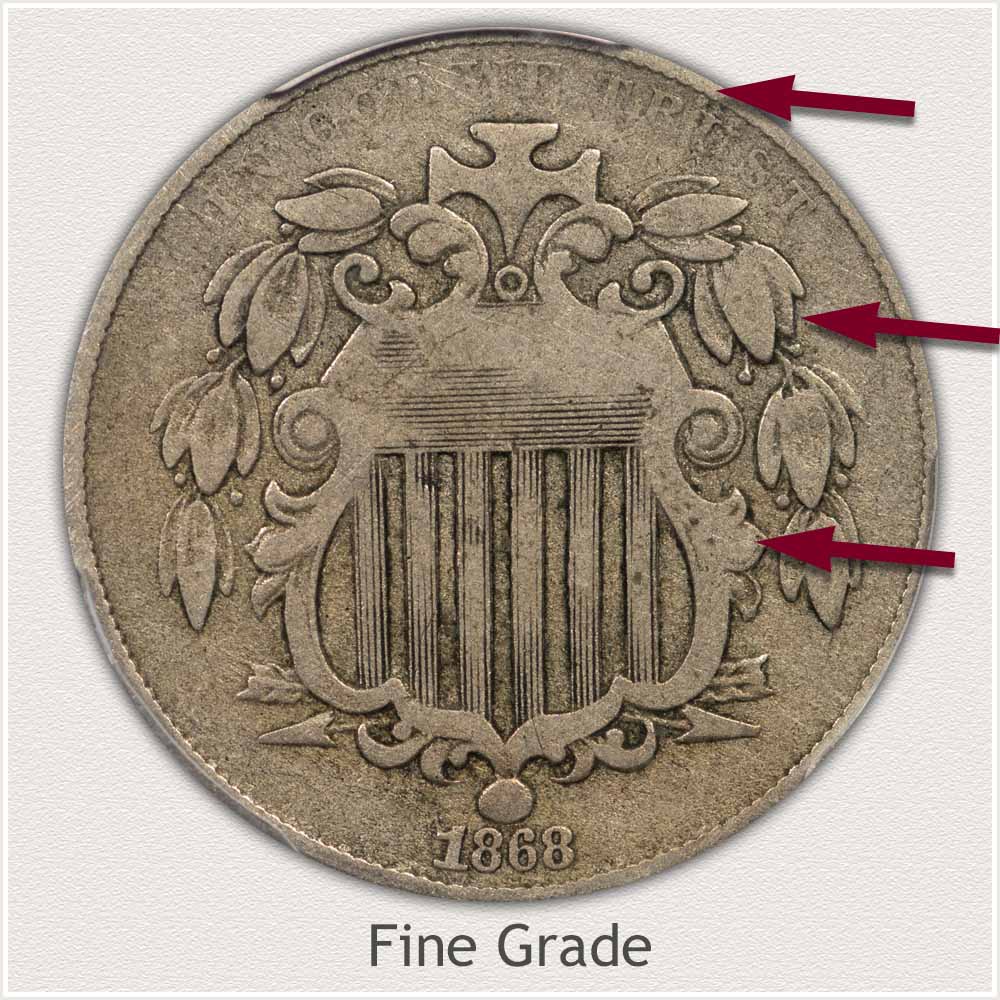
Fine Grade: In Fine grade a circulated coin has lost most of the finer detail of the design. Even wear covering the entire coin with moderate loss of detail describes and defines the condition into a grade.
Although major designs are still separated such as leaves, they lack inner detail and flattened metal is displayed. Border to the shield is now mostly flat. Notice the letters at the top rim are weak. Often weak letters are displayed. Fading and merging of horizontal and vertical lines within the shield are confirming the grade.
Good Grade Shield Nickel
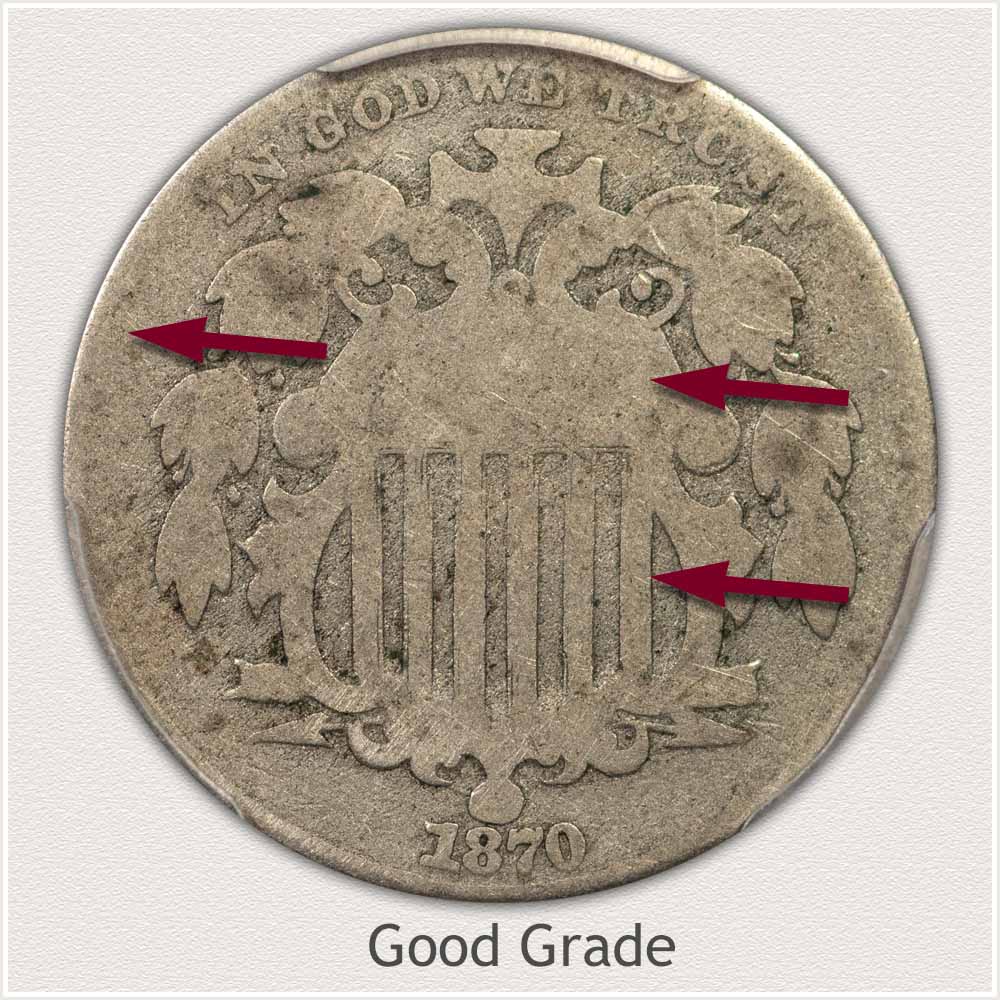
Good Grade: With most design features only in outline form is defining the grade. Good grade nickels show heavy wear throughout. An outline of the shield remains, although weak, and lettering is beginning to fade into the rim.
A clear indication of the condition is the missing fine vertical and horizontal lines within the shield. These fine vertical lines are now merged forming wider bands. A flattened appearance and faded rims place the coin solidly in the Good grade range.
Grading Liberty Nickels
Mint State Grade Liberty Nickel
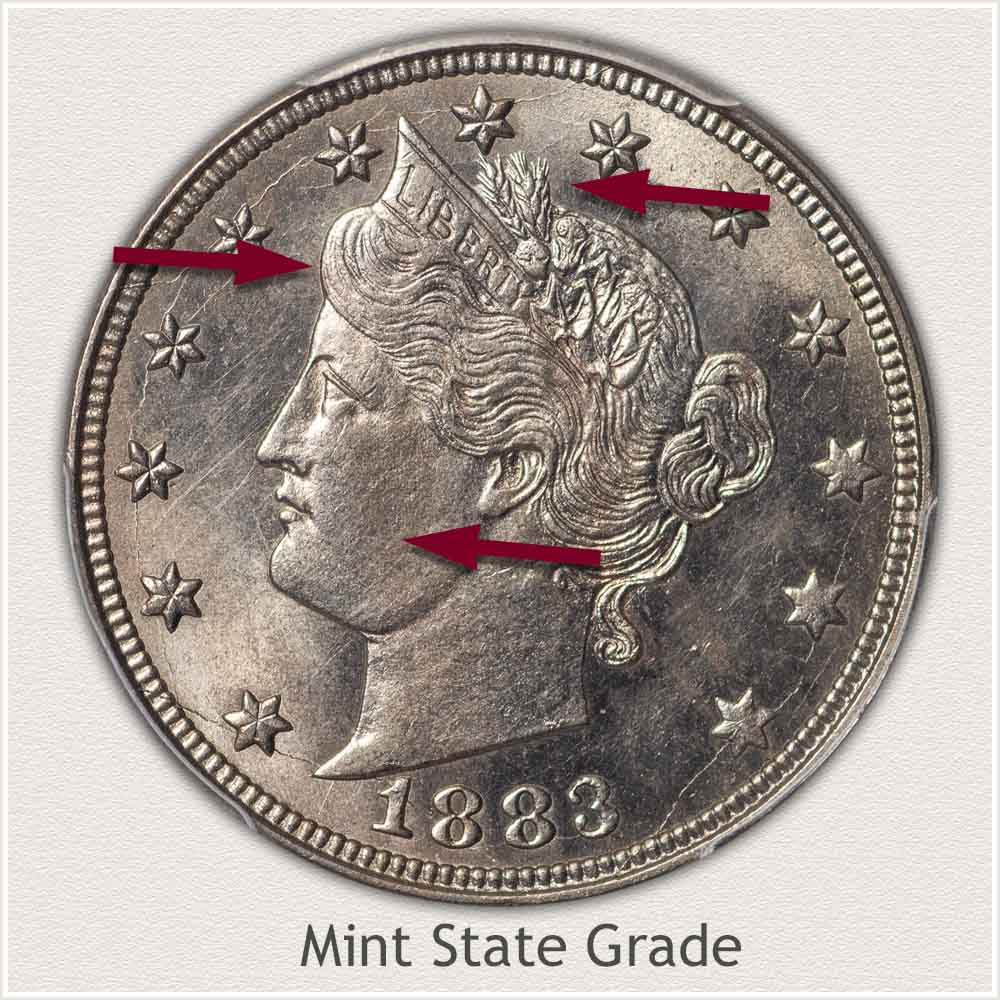
Mint State: Mint State Liberty nickels represent the top-quality grade. These are highly sought by collectors. Defining the grade and describing the condition is - no wear disrupts the surface. A fine texture when minted covers the surface and results in the radiating shine.
Inspecting Liberty's hair above her forehead shows no smoothing to the luster and dulling color of the metal. Also, of fine detail and high in relief are the grains of wheat above the headband. No flattening of details and remaining luster covering the metal is confirming the grade.
Completing the inspection is Liberty's cheek remains without any signs of smoothing due to wear. A similar appearance is found on the cheek matching the fields of the coin.
Extremely Fine Grade Liberty Nickel
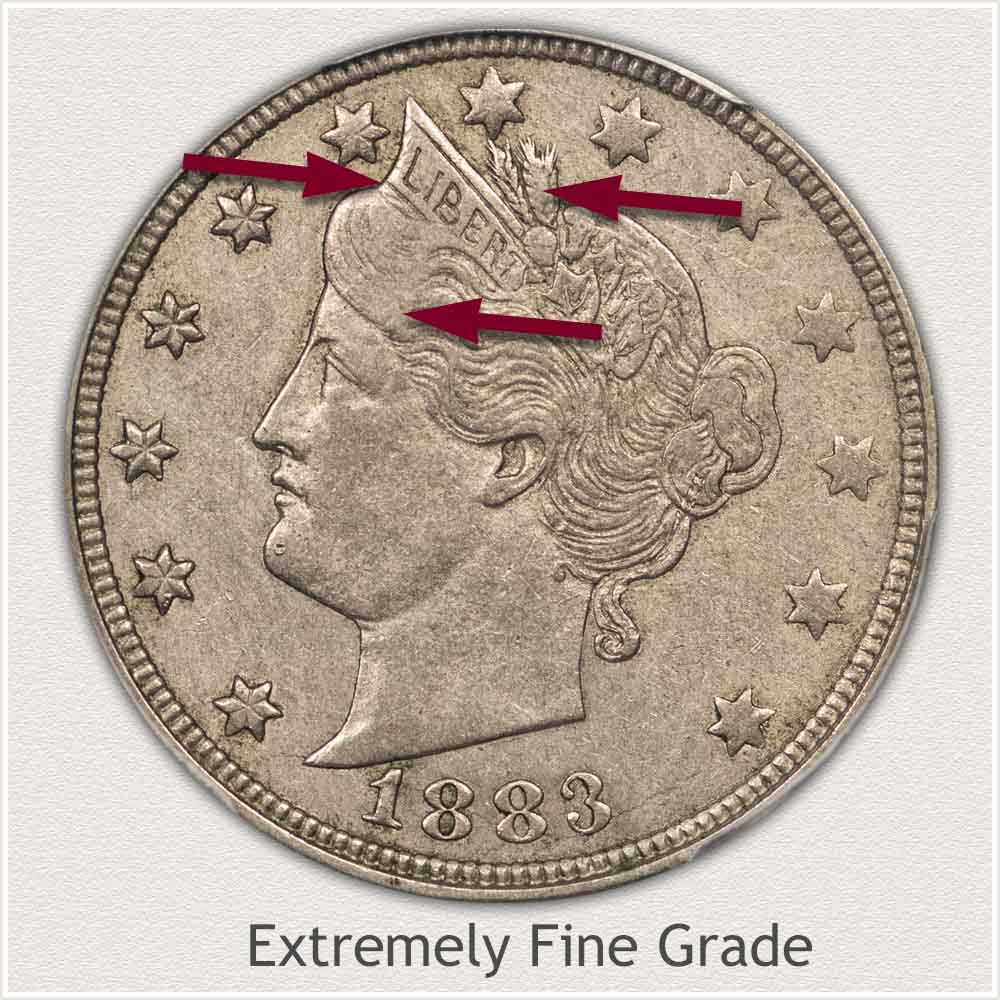
Extremely Fine: Once the bright shine is missing and replaced with a gray smooth surface, this a clear indication of wear. Defining the Extremely Fine grade is; wear has cause only minor flattened areas. Just slight smoothing is visible on high profile points to the design.
Fine lines in Liberty's hair remain visible and distinct. Evidence of wear is confined just above her forehead, with missing and merged lines. A crisp overall appearance is necessary to achieve this quality condition.
Fine Grade Liberty Nickel
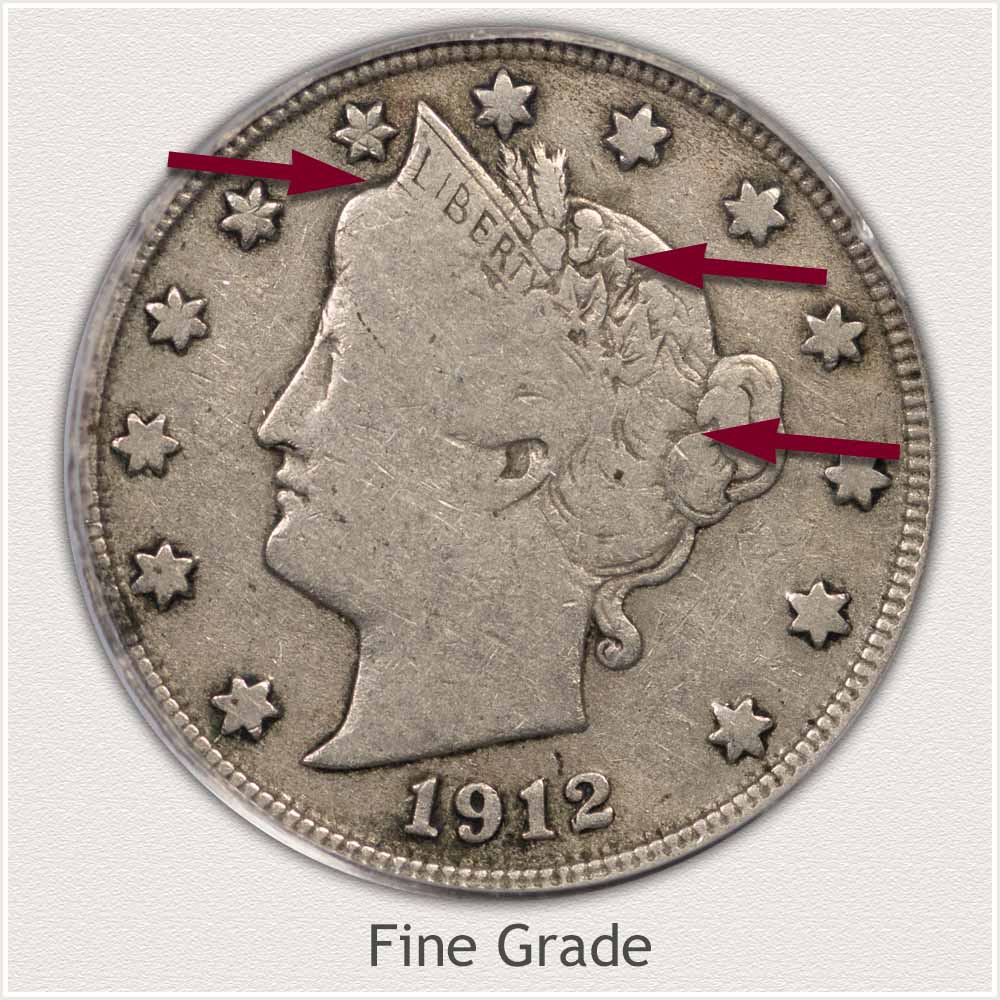
Fine Grade: A stand-out appearance of a nickel in Fine grade is recognizable wear beginning to cover the entire portrait. Many features are now smooth, missing detail, and showing just remnants of the wreath.
Important to qualify for the grade is "LIBERTY" readable within the headband. Secondly, indications of hair strands are visible towards the back of the head, close to the tie in her hair. These few finer details remaining are key features helping define the grade.
Good Grade Liberty Nickel
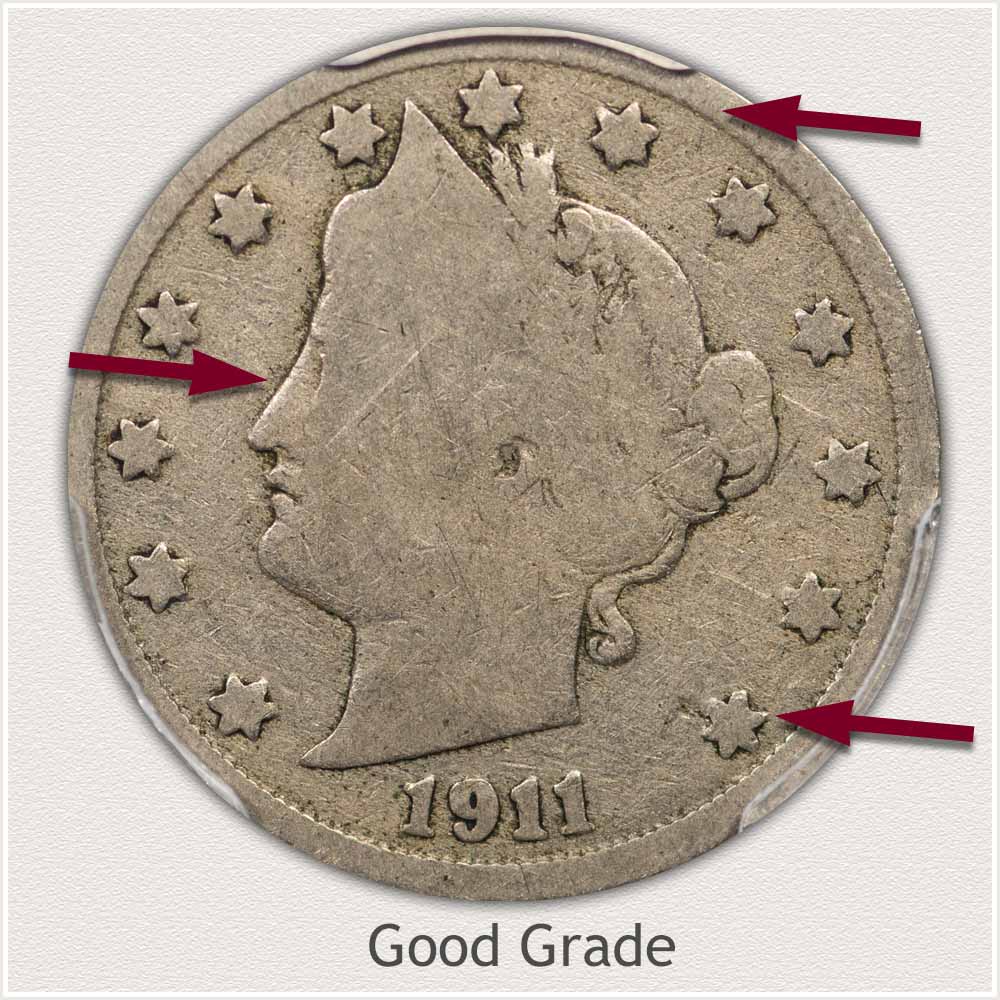
Good Grade: Liberty's portrait worn smooth with a complete and defined rim describes these nickels in Good grade. A heavily worn coin benefits from a clearly outlined Liberty, stars fully outlined and separate of the rim, and a bold date easily readable.
With strong outlines the appearance remains above the "worn out" look. A complete lack of noticeable marks and dents to the rim is a large factor to this coin's appeal. Many beginning collectors start with coins of this quality, a nice affordable example of an old nickel series.
Step 3: | Special Qualities of the Historical 1883 Nickels
A Unique Early Year of U.S. Nickels
The older design, Shield nickel, was the first nickel alloy five cent denomination of U.S. coinage. These nickels were introduced in 1866 and circulated along-side a silver "half dime" denomination at the time. These nickels ended in 1883, overlapping with the next design series.
In 1883, the new "Liberty" nickel was introduced, featuring a large portrait of Liberty on the obverse. With a central, prominent "V" the Roman numeral for five, as the device of the reverse. U.S. coinage and its designs entered a new era. It was the lack of indicating the denomination - CENTS- along with the "V" that quickly became a problem for the mint. All other coinage in circulation bore a clearly defined denomination. Confusion among the population became a problem in need of solving. Quickly, the mint redesigned and added CENTS to the lower portion of the coin and went on to strike millions of these updated nickels.
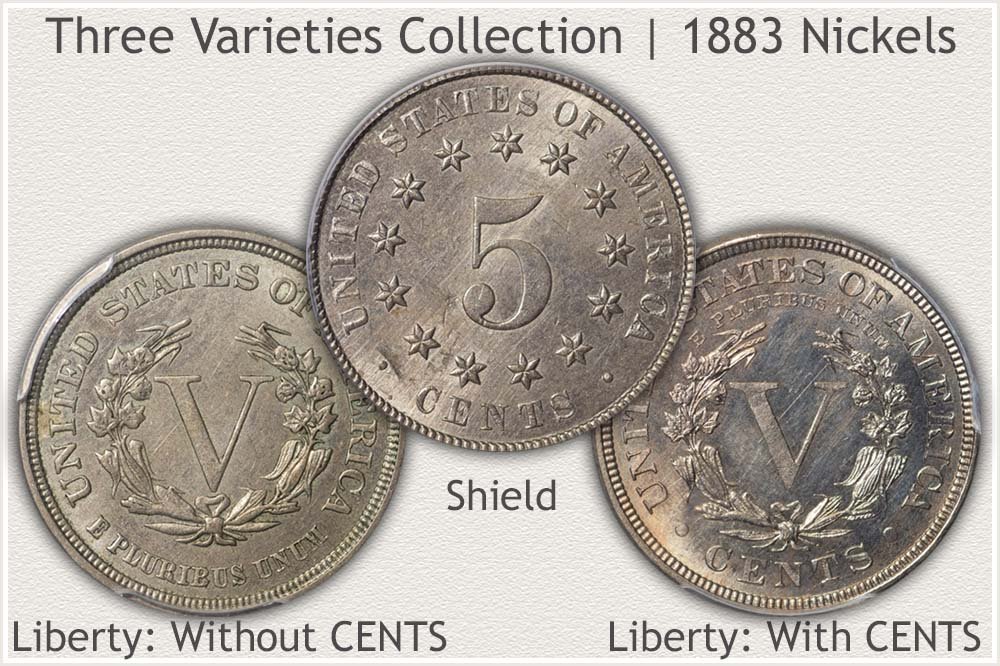
The result of 1883 nickel design changes are; three distinct varieties available, and in total, over 22 million nickels were produced in this busy year for the Philadelphia mint.
Today, with is intriguing history of all varieties, 1883 nickels are a popular interest to collectors. A year nickels spanned two series, the Shield and Liberty designs. Also, a short lived unique, unclear denomination variety, and the ending and beginning years of two design series.
These 1883 nickels enjoy strong demand from both dealers and collectors and are quickly added to collections. Circulated pieces are affordable to new collectors, and experienced collectors seek higher end quality examples for advanced collections. A very nice coin, of any of the three varieties, to find in a box of old coins.
References
U.S. Mint. Catalogue of Coins of the United States
https://nnp.wustl.edu/library/book/554591
U.S. Mint. 1883 U.S. Mint Annual Report
https://nnp.wustl.edu/library/book/311
U.S. Mint. 1884 U.S. Mint Annual Report
https://nnp.wustl.edu/library/book/514116
Coin Values | CoinStudy Articles
Begin with a complete listing of Shield nickel values. Confirm dates and proceed with the grading condition step. Discover how much these now very old nickels are worth.
The Value of V Nickels | A Series with a Wide Range in Rarity
Popularity of the Liberty design nickels is steady to growing. Value chart listing all dates and mints shows the demand for scarce issues and grades. Early years are rising in values, especially in higher collectible condition.
Old Nickel Values | Guide to Nickels
Become familiar with the different vintage nickel series, identified when matching to images. Each series of nickels is covered with value charts and a step-by-step method to determine values. Shield to Liberty nickels are highlighted along with the popular Buffalo and Jefferson nickels. Important to value is condition, judged with descriptions, video, and detailed images.
Grading Old Nickels | How to Video Series
Additional grading info helping determine the condition of Shield and Liberty nickel series. Videos, images, and descriptions are used to focus on key features helping decide on condition of the old nickels. With both series, small improvements in quality increases higher premium potential.
Popular Coin Series | Liberty Nickels
Popularity is the starting base to coin values. Demand from collectors and dealers serving them determines how much these Liberty nickels are worth. Listings of all coin series by their popularity gives insight to the strength of demand.Selling Coins | A Defined Process
Many of these vintage nickels are potentially very valuable. Shield and Liberty series are a premium when following a defined process when time to sell. Use the resources to identify an accurate worth and listings of dealers to contact to receive market value.
★Coin Values Discovery finds 1883 Nickel Value and...
Visit the Coin values main index. Determine how much your box of old coins is worth. Dates, mints, and condition are covered by following images to the different series, all valued individually. Importantly, use the step-by-step method, comparing your coin to descriptions, images, and videos helping identify the important qualities to a narrow value range.
